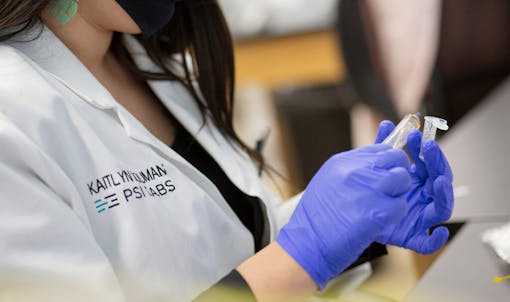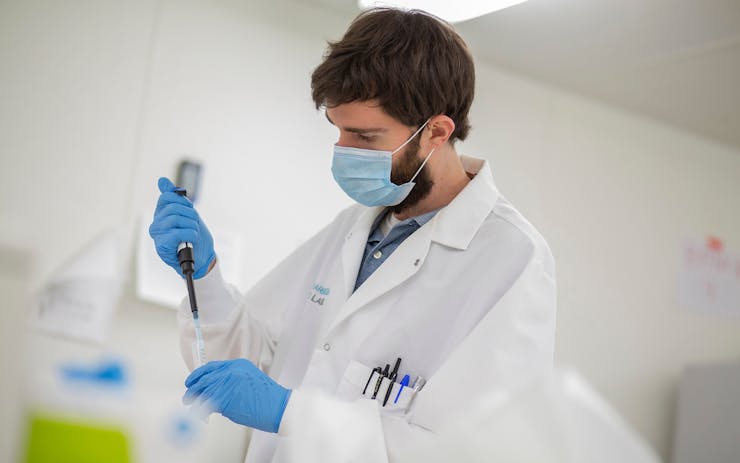This article was produced in partnership with PSI Labs.
With inconsistent testing and market pressures, the numbers don’t always tell the whole story.
Cannabis legalization means consumers are more informed than ever—at least, theoretically. Most legal-cannabis states have some sort of testing requirement designed to put safe products on the shelves and to give the public some idea and assurance of what they’re buying.
The problem: Too often, cannabis isn’t quite what it says on the label.
If you follow cannabis regulation, you’ve already seen some pretty epic mishaps. California has seen its fair share of recalls—some from inconsistent lab results, but others from flagrant lab result falsification. In Washington State, a top testing firm had its license suspended for inflating THC numbers.

One persistent issue in many states is “lab shopping,” where cannabis producers specifically choose testing labs they know will give them intentionally inflated potency scores or an easy pass on purity.
According to chemist Lev Spivak-Birndorf, Ph.D., co-founder of Michigan testing firm PSI Labs, the results can get pretty gross—and it’s an issue that puts the safety of regulated cannabis into question.
“Consumers just assume that if it’s on the shelf, it passed the test,” says Spivak-Birndorf. “Michigan’s had trouble with this: Flower will have visible mold or powdery mildew on it, and it won’t be detected by certain microbial tests. People will report to the state, ‘Hey, there’s mold on this weed that I bought at a dispensary, how did this pass tests?’ ”
A combination of regulatory failures and market forces have made inconsistent testing an increasing problem—so when consumers or even budtenders look at just the numbers on a lab label and not where they come from, they don’t have the whole story.
A tough market
When dispensaries are selecting what kind of bud to buy, they know that in most cases, potency is what sells. So, in the race to have the strongest weed, producers are looking for bigger numbers on the label. It’s a vicious cycle: When a few bad actors seek out inflated THC levels, the baseline that other producers need to hit to get their products on the shelves grows.

Because cannabis producers self-select their testing labs, it’s not just the incentive to go lab-shopping that’s the issue, says Spivak-Birndorf. The labs themselves need to attract those producers.
Shop highly rated dispensaries near you
Showing you dispensaries near“We built our reputation over the years as being a reliable and accountable lab producing accurate and honest results,” says PSI Labs co-founder Ben Rosman. “Because someone thinks, ‘I might not get my desired results from PSI Labs,’ they may lab shop and hope to find more favorable results elsewhere. However, we also have clients who take pride in having PSI Labs on their label because they know it’s a sign of their commitment to the accuracy, safety, and quality consumers deserve.”
Inconsistent science

While it’s true that bad actors exist, many cannabis producers just want to make top-quality products backed up by accurate lab testing results. But some testing methods and regulatory processes aren’t necessarily designed to hold up to scrutiny. In Michigan, says Rosman, labs are often asked to check their own work.
“We already retest everything ourselves twice to make sure that high potency numbers are legit,” says Rosman. “If the state’s process for auditing samples is to then ask the lab that performed the original analysis to check its own work, that lab can simply confirm its own inflated results. Wouldn’t it be a better approach to have another licensed lab also audit the sample and provide a new set of data?”
PSI Labs has a rigorous set of internal standards, but they’re self-implemented: While regulatory change is coming down the pipeline, most labs aren’t required to use the most accurate processes to check for contaminants.
“It’s incredibly hard to understand which lab is using the right process,” says Spivak-Birndorf, “and consumers are just 100% in the dark.”
The reality is, as long as cannabis remains federally illegal, the necessary standardization for cannabis testing methodologies will remain unrealized, and the patchwork of state-based laws and recommendations will continue to fail consumers and good faith actors in the industry alike.
Finding trusted results
Inaccurate labels are an obvious current problem: Nobody wants disappointing or dangerous weed. But in the long-term, inaccurate numbers could be worse than no labels at all.
“If there’s so much variability and you can’t trust one lab’s data against another, it doesn’t matter if it says, ‘lab tested’,” explains Rosman.

Fortunately, states are starting to recognize the need for standardized testing. California, Alaska, Colorado, and Maryland have all tightened their regulations in recent years.
While other states fine-tune their policies and the push for federal legalization continues, it’s important that consumers and budtenders know that the numbers don’t currently tell the whole story. For now, consumers should keep an eye out for recalls issued by state regulators, and push lawmakers to button down testing regulations that are less reliant on self-policing, more objective, and can stand up to scrutiny.

PSI Labs, the leading testing lab in Michigan, is dedicated to helping clients offer superior cannabis through accurate testing and transparency. Visit PSILABS.org to learn more.





